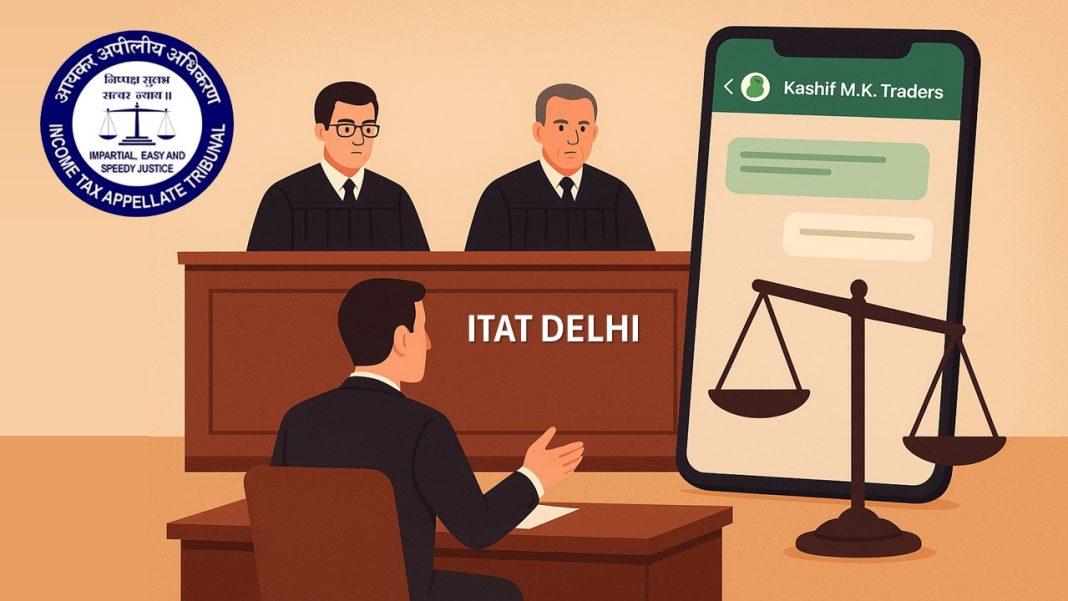Income Tax Addition Based on WhatsApp Messages Invalid: ITAT
The present appeal has been filed by a company named M/s. LSL Tools (P) Limited, Gurugram, Haryana (Appellant), having PAN no. AABCK7484L, against ACIT Central Circle-1, Faridabad (Respondent), in the Income Tax Appellate Tribunal (ITAT) Delhi Bench ‘E’: New Delhi before Shri S. Rifaur Rahman (Accountant Member) and Shri Anubhav Sharma (Judicial Member). The case was heard in the court on August 06, 2025, and was decided on October 30, 2025.
Through the current appeal, the assessee challenged orders dated 11.11.2024 and 25.11.2024 relating to the assessment years 2020-21 and 2021-22, respectively, issued by CIT(A). As the issues in both orders are connected to each other, they have been heard simultaneously. On November 10, 2021, the Revenue conducted a seizure operation under section 132 of the Income-tax Act, 1961, at the residential as well as office location of the assessee.
On November 20, 2022, the assessee filed its income tax return (ITR), declaring a total income amounting to Rs. 35.67 crore. Later, the return was selected for the purpose of inspection, and thereafter, notices were issued under Sections 143(2) and 142(1) of the Act via the ITBA Portal. In response to the notices, the assessee filed its reply. At the time of the personal hearing, the authorised representative of the assessee highlighted Ground Nos. 4 to 4.3 and Ground No. 5 only (listed in the official judgement). The representative either talked about any other grounds or made any submissions to them.
Key Issues Raised by the Assessee
- Jurisdiction Issue: Claims the assessment order is invalid, as jurisdiction was transferred after notice was issued.
- No Valid Approval Under Section 153D: Argues assessment is without mandatory approval.
- Disallowance of Salary (Rs. 44.10 Lakhs) Paid to Director: AO disallowed salary paid to Ms Priti Singla under Section 40A(2)(b), claiming she was not qualified or involved.
- Addition of Rs. 5 Lakhs for Alleged Cash Sales: AO alleges unrecorded profit based on WhatsApp chats.
- Imposition of Interest Under Section 234C: Assessee contends interest is not applicable. Only issues related to salary disallowance and the addition of cash sales were pressed during the hearing.
Thereafter, the assessee approached the Income Tax Appellate Tribunal (ITAT) Delhi Bench ‘E’. Here are the key findings made by the tribunal:
- Salary Disallowance of Rs. 44,10,000:
- The AO relied on statements made by Ms Priti Singla under oath during the search, where she admitted lack of knowledge and involvement.
- The assessee argued that salary is taxed in her hands; disallowing it in the company’s hands leads to double taxation.
- Disallowance based only on a statement, without any proof of its bogus nature, is invalid.
- Several case laws support that disallowance cannot be based on suspicion or mere statements.
- Addition on Cash Sales of Rs. 500,000
- AO assumed undisclosed sales based on a WhatsApp chat with “Kashif M.K. Traders”.
- Assessee clarified that no such cash sales were made; Vikas Singla (director) denied any cash deal.
- No independent verification was done by AO (e.g., issuing notices to the alleged party).
- The assessee argued that no proper evidence was found to prove cash sales. WhatsApp chats are unreliable without Section 65B certification. The addition is made on assumptions and is unjustified.
To announce its final decision, the tribunal cited some earlier judgements relating to the same issue:
The Supreme Court recently decided a case titled Addl. Director General Adjudication vs. Suresh Kumar and Co. Impex Pvt. Ltd, dated August 20, 2025, about using electronic evidence in Customs Act proceedings. The Court said that electronic evidence can be accepted only if a proper certificate (as per section 138C(4) of the Customs Act) is provided. This requirement is similar to section 65B(4) of the Indian Evidence Act.
In another case titled Arjun Panditrao Khotkar v. Kailash Kushanrao Gorantyal (2020), the Supreme Court explained that section 65B(4) is mandatory to follow, but it depends on the situation in each case. They also used two legal principles that mean “the law does not require the impossible” and “a person is excused when compliance is impossible.” In the Suresh Kumar case, the Court said that if the rules are mostly followed (“substantial compliance”), the electronic evidence may still be allowed.
So, if the Income Tax Act does not have specific rules for electronic evidence, the Manual by the Board becomes very important. Tax officials must at least follow the Manual properly so that any electronic evidence they use will stand up in appeals. But in this case, the addition of income was based only on WhatsApp chats, which were incomplete and needed interpretation. That’s not enough proof to make such income additions. Therefore, we agree with the taxpayer’s argument for the year 2021–22.
Therefore, the tribunal has allowed both appeals.
Citation: M/s. LSL Tools (P) Limited Vs ACIT (ITAT Delhi); ITA No.5643/DEL/2024 & ITA No.5644/DEL/2024; 30/10/2025; 2020-21 & 2021-22
Refer to the official judgement for complete information



